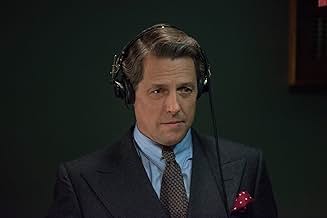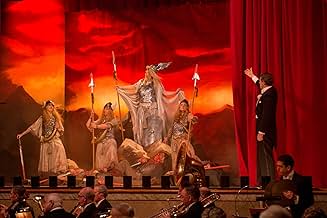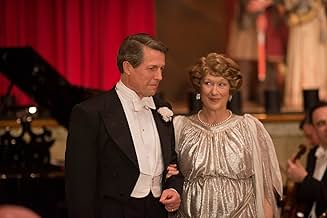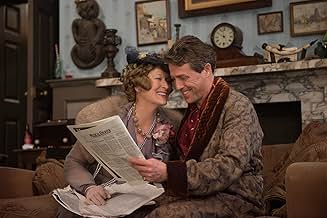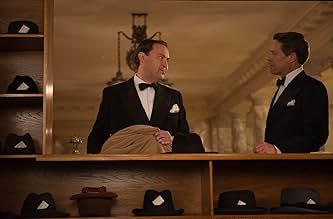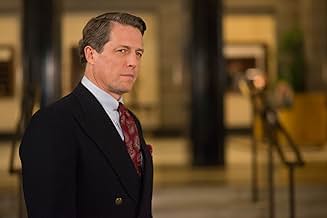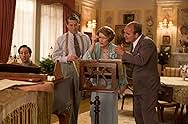Florence Foster Jenkins
- 2016
- Tous publics
- 1h 51m
IMDb RATING
6.8/10
61K
YOUR RATING
The story of Florence Foster Jenkins, a New York heiress who dreamed of becoming an opera singer, despite having a terrible singing voice.The story of Florence Foster Jenkins, a New York heiress who dreamed of becoming an opera singer, despite having a terrible singing voice.The story of Florence Foster Jenkins, a New York heiress who dreamed of becoming an opera singer, despite having a terrible singing voice.
- Nominated for 2 Oscars
- 10 wins & 48 nominations total
- Director
- Writers
- All cast & crew
- Production, box office & more at IMDbPro
Featured reviews
Perpetuating little white lies is part of everyday life and keeps society ticking over. But to what point is it acceptable to massage an ego with a dirty black lie. A real whopper. And is such a lie perpetuated by love? Greed? Or the pursuit of personal glory? This is the rather subtle sub-text behind the story of Florence Foster Jenkins.
Based on a true story, Florence Foster Jenkins tells the story of a truly awful singer (Meryl Streep), cossetted in her closed world of a 1944 New York hotel and pampered by her husband St Clair Mayfield (Hugh Grant), who is otherwise entwined with the sensuous Kathleen (Rebecca Ferguson). Together with ex-actor Mayfield, the wealthy Florence is the co-star of the show at her self-owned "Verdi Club" where she has a non-speaking role enacting various 'tableau' scenes. But in the interests of following her dreams she recruits the help of famous singing instructor Carlo Edwards (the marvellous David Haig) and an enthusiastic and personable young pianist Cosme McMoon (Simon Helberg, "The Big Bang Theory"). Carlo is aware of what he is in for (he wants to keep the arrangement 'on the quiet'); Cosme is not (to great comic effect).
This classic re-telling of 'The Emperor's New Clothes' ultimately takes us on a journey to a packed concert at the Carnegie Hall, where many of the tickets have been given away to rowdy and drunk servicemen.
It's impossible to describe a film as "delightful just delightful" without hearing the velvety tones of Hugh Grant saying those words. But that's what it is. A treat of moving and at times wildly funny storytelling from director Stephen Frears ("Philomena", "The Queen") that just works from beginning to end.
Meryl Streep is just glorious in the titular role, oozing charm. Those UK readers will probably fondly remember the piano playing 'skills' of the late, great comedian Les Dawson (google it for a youtube clip) who had to be an absolutely brilliant pianist to be able to deliberately play so badly. In a similar way, we know (from the likes of "Mamma Mia") that Streep knows how to belt out a good tune, so it requires some considerable skill to deliver Florence's songs as well (or as badly) as she does. Bravo Ms Streep, Bravo!
And Hugh Grant is often quite unfairly criticized for playing Hugh Grant in every movie (as if Tom Hanks and Harrison Ford are much different?), but here he turns in a totally sterling performance. The drivers behind Mayfield's character are never totally clear (and I won't spoil that here), but in the final reel the motivating factor becomes crystal clear, and Grant has never been better. (Bravo Mr Grant, Bravo!).
To round off the accolades for the lead performances, Simon Helberg turns in a genius comic performance as the goggle-eyed pianist, who lights up every scene he's in and delivers his lines (e.g. one about a naval encounter) with perfect comic timing.
Shining again in a supporting role is Rebecca Ferguson ("Mission Impossible: Rogue Nation") who once again is dazzling. Among the bright young acting newcomers of the likes of Vikander and Rooney, Ferguson (who is approaching her mid-30s) brings a level of sophisticated glamour and maturity to the screen that is strongly reminiscent of the great starlets of the 1940's and 50's like Kathrine Hepburn or Lana Turner. She is fast becoming one of my favourite actresses. Also worthy of note is Nina Arianda as gold- digging starlet Agnes Stark – effectively playing (at least at first) the "little boy in the crowd" in the Emperor's fable.
Written by TV-writer Nicholas Martin in his big-screen debut, the story is slowly and subtly unwoven, only progressively revealing the plot points in an intelligent manner. Other screenwriters take note: this is how to do it.
Cinematography is by the great Danny Cohen ("The Danish Girl"; "Room") and with the Production Design, Costuming and Special effects crew 1940's New York is vibrantly brought to life.
While the film's leisurely pace might make the younger set fidgety, this is a treat particularly for older viewers looking for a great night out at the cinema. The film got a good old-fashioned round of applause at my showing when the credits came up. "Delightful just delightful". Go see it.
(Please visit http://bob-the-movie-man.com for the graphical version of this review and to comment with your thoughts. Thanks).
Based on a true story, Florence Foster Jenkins tells the story of a truly awful singer (Meryl Streep), cossetted in her closed world of a 1944 New York hotel and pampered by her husband St Clair Mayfield (Hugh Grant), who is otherwise entwined with the sensuous Kathleen (Rebecca Ferguson). Together with ex-actor Mayfield, the wealthy Florence is the co-star of the show at her self-owned "Verdi Club" where she has a non-speaking role enacting various 'tableau' scenes. But in the interests of following her dreams she recruits the help of famous singing instructor Carlo Edwards (the marvellous David Haig) and an enthusiastic and personable young pianist Cosme McMoon (Simon Helberg, "The Big Bang Theory"). Carlo is aware of what he is in for (he wants to keep the arrangement 'on the quiet'); Cosme is not (to great comic effect).
This classic re-telling of 'The Emperor's New Clothes' ultimately takes us on a journey to a packed concert at the Carnegie Hall, where many of the tickets have been given away to rowdy and drunk servicemen.
It's impossible to describe a film as "delightful just delightful" without hearing the velvety tones of Hugh Grant saying those words. But that's what it is. A treat of moving and at times wildly funny storytelling from director Stephen Frears ("Philomena", "The Queen") that just works from beginning to end.
Meryl Streep is just glorious in the titular role, oozing charm. Those UK readers will probably fondly remember the piano playing 'skills' of the late, great comedian Les Dawson (google it for a youtube clip) who had to be an absolutely brilliant pianist to be able to deliberately play so badly. In a similar way, we know (from the likes of "Mamma Mia") that Streep knows how to belt out a good tune, so it requires some considerable skill to deliver Florence's songs as well (or as badly) as she does. Bravo Ms Streep, Bravo!
And Hugh Grant is often quite unfairly criticized for playing Hugh Grant in every movie (as if Tom Hanks and Harrison Ford are much different?), but here he turns in a totally sterling performance. The drivers behind Mayfield's character are never totally clear (and I won't spoil that here), but in the final reel the motivating factor becomes crystal clear, and Grant has never been better. (Bravo Mr Grant, Bravo!).
To round off the accolades for the lead performances, Simon Helberg turns in a genius comic performance as the goggle-eyed pianist, who lights up every scene he's in and delivers his lines (e.g. one about a naval encounter) with perfect comic timing.
Shining again in a supporting role is Rebecca Ferguson ("Mission Impossible: Rogue Nation") who once again is dazzling. Among the bright young acting newcomers of the likes of Vikander and Rooney, Ferguson (who is approaching her mid-30s) brings a level of sophisticated glamour and maturity to the screen that is strongly reminiscent of the great starlets of the 1940's and 50's like Kathrine Hepburn or Lana Turner. She is fast becoming one of my favourite actresses. Also worthy of note is Nina Arianda as gold- digging starlet Agnes Stark – effectively playing (at least at first) the "little boy in the crowd" in the Emperor's fable.
Written by TV-writer Nicholas Martin in his big-screen debut, the story is slowly and subtly unwoven, only progressively revealing the plot points in an intelligent manner. Other screenwriters take note: this is how to do it.
Cinematography is by the great Danny Cohen ("The Danish Girl"; "Room") and with the Production Design, Costuming and Special effects crew 1940's New York is vibrantly brought to life.
While the film's leisurely pace might make the younger set fidgety, this is a treat particularly for older viewers looking for a great night out at the cinema. The film got a good old-fashioned round of applause at my showing when the credits came up. "Delightful just delightful". Go see it.
(Please visit http://bob-the-movie-man.com for the graphical version of this review and to comment with your thoughts. Thanks).
A kind of 'companion piece' to THE KING'S SPEECH. After the monarch who couldn't speak publicly we are invited to meet the soprano who should never have sung to an audience. This is the more-or-less true story of the 1940s New York socialite who seemingly did not know how monumentally awful her singing was. Florence Foster Jenkins was a Woman of Substance in more than one sense: a mega-rich heiress, built like a leaking sandbag and possessed of an immense ego.
It's a gift of a part, and Meryl Streep goes for it at full throttle, combining elements of Ethel Merman, Hyacinth Bucket and Nellie Melba to stupendous effect. The supporting cast are also given juicy roles to wallow in and, boy, do they wallow! Hugh Grant's lightweight shtick works perfectly for Florence's second husband, who openly keeps a mistress but dotes like a puppy-dog on his ailing wife, indulging her musical delusion with a passion that fully matches her own. David Haig plays Florence's vocal coach in the manner of a pantomime horse.
Simon Helberg steals many a scene as her gay accompanist who finds it hard to keep a straight face but comes to be caught up in the typhoon of Florence's enormous self-belief. There are some delicious cameos among the members of the New York elite who support the fantasy with varying degrees of sincerity. The finale, Florence's sell-out concert at Carnegie Hall is a comedic if not exactly a musical triumph.
This is a slight story, crisply scripted, elegantly photographed and stylishly directed (by Stephen Frears). Streep steams through it like an ocean liner – there's more than a hint of Queen Mary the 'former first lady' as well as Queen Mary the excessively luxurious vessel. Yet another Oscar could easily come her way. In Dustin Hoffman's QUARTET I felt slightly cheated that the principals never actually sang. Here you look forward with a kind of awed dread to the moments when the fat lady sings!
It's a gift of a part, and Meryl Streep goes for it at full throttle, combining elements of Ethel Merman, Hyacinth Bucket and Nellie Melba to stupendous effect. The supporting cast are also given juicy roles to wallow in and, boy, do they wallow! Hugh Grant's lightweight shtick works perfectly for Florence's second husband, who openly keeps a mistress but dotes like a puppy-dog on his ailing wife, indulging her musical delusion with a passion that fully matches her own. David Haig plays Florence's vocal coach in the manner of a pantomime horse.
Simon Helberg steals many a scene as her gay accompanist who finds it hard to keep a straight face but comes to be caught up in the typhoon of Florence's enormous self-belief. There are some delicious cameos among the members of the New York elite who support the fantasy with varying degrees of sincerity. The finale, Florence's sell-out concert at Carnegie Hall is a comedic if not exactly a musical triumph.
This is a slight story, crisply scripted, elegantly photographed and stylishly directed (by Stephen Frears). Streep steams through it like an ocean liner – there's more than a hint of Queen Mary the 'former first lady' as well as Queen Mary the excessively luxurious vessel. Yet another Oscar could easily come her way. In Dustin Hoffman's QUARTET I felt slightly cheated that the principals never actually sang. Here you look forward with a kind of awed dread to the moments when the fat lady sings!
This is the most surprising film ever. You know it is about a woman who can't sing for toffee but who hosts huge concerts to not exactly appreciative audiences. Why on earth would this make for a compelling film? The surprising thing is that cast, script and direction are perfectly in tune with this compassionate biographical treatment of a woman driven to be the musician she dreams she is. Knocked by paternal disapproval, marital failure and physical illness, Florence 'thinks positive' and takes action. She knows what it is to suffer and is ready, at the drop of a hat, to do what she can to be of service to others via her self declared life-passion 'music'. It is both a joy and heart breaking to live in this woman's world. Meryl Streep is absolutely perfect in this role and makes this difficult story heart-rending and laugh out loud all at once. Definite go see!
This one pleasantly surprised me. Meryl Streep does a nice job as the real-life untalented Ms. Jenkins, who is surrounded by people who just want to make her happy. She hires a pianist (Simon Helberg, one of the geeks from "The Big Bang Theory") but no one will tell her how bad she is, least of all her husband, played by Hugh Grant. Inspired by the boys fighting in WW II, she cuts a record, then manages to book a concert at Carnegie Hall for the troops. (One flaw during the concert - the actress who plays Tallulah Bankhead is way too good-looking to be believable as the actual Bankhead.)
Streep pulls off the role very well. I found myself laughing at some of the voice rehearsals, but feeling a twinge of sorrow as this woman was trying to pursue a dream seemingly beyond her reach. Helberg is quirky as her pianist, who realizes she stinks, but comes around to supporting her. The big surprise for me was the performance of Hugh Grant. Just watch his eyes and you will see his every emotion, from his affection for Streep (despite his having an affair), his desire to make her happy, and his anguish as he watches her bomb. His performance is the most impressive.
Solid performances, good script, laugh-out-loud moments, and tender scenes. Good movies are still being made, folks.
Streep pulls off the role very well. I found myself laughing at some of the voice rehearsals, but feeling a twinge of sorrow as this woman was trying to pursue a dream seemingly beyond her reach. Helberg is quirky as her pianist, who realizes she stinks, but comes around to supporting her. The big surprise for me was the performance of Hugh Grant. Just watch his eyes and you will see his every emotion, from his affection for Streep (despite his having an affair), his desire to make her happy, and his anguish as he watches her bomb. His performance is the most impressive.
Solid performances, good script, laugh-out-loud moments, and tender scenes. Good movies are still being made, folks.
Florence Foster Jenkins (2016)
There certainly are reasons to see this movie, but they won't make this a great movie. It's a good movie, though, and good fun. Based on a very true story, the rise of this very bad singer into popular consciousness is worth telling.
As always, Streep is virtuosic. Maybe that's a problem in a way, because they depend so much on her being convincing and compelling that they use too much of her. Impossible? Not at all—the plot is simple enouch as it is, and it stalls with long sections of Streep singing really badly really well. It's not easy to be bad on purpose. But it you itch for more sometimes.
Hugh Grant? An interesting and not quite canny casting move (is this a problem with having more than one casting director?). He's stretching himself slightly out of the typecasting he's been stuck in (successfully) for years. And it actually clicks pretty well, and yet isn't quite a fit for Streep. Or for the time period (WWII New York, more or less).
You can read the remarkable details of this woman's life elsewhere—and in the final credits—and it's what holds it all together, of course. But this is a movie, and it doesn't fill in and make vivid the experience (the movie experience) fully. You'll see. Enjoyable but ultimately thin.
There certainly are reasons to see this movie, but they won't make this a great movie. It's a good movie, though, and good fun. Based on a very true story, the rise of this very bad singer into popular consciousness is worth telling.
As always, Streep is virtuosic. Maybe that's a problem in a way, because they depend so much on her being convincing and compelling that they use too much of her. Impossible? Not at all—the plot is simple enouch as it is, and it stalls with long sections of Streep singing really badly really well. It's not easy to be bad on purpose. But it you itch for more sometimes.
Hugh Grant? An interesting and not quite canny casting move (is this a problem with having more than one casting director?). He's stretching himself slightly out of the typecasting he's been stuck in (successfully) for years. And it actually clicks pretty well, and yet isn't quite a fit for Streep. Or for the time period (WWII New York, more or less).
You can read the remarkable details of this woman's life elsewhere—and in the final credits—and it's what holds it all together, of course. But this is a movie, and it doesn't fill in and make vivid the experience (the movie experience) fully. You'll see. Enjoyable but ultimately thin.
Did you know
- TriviaMeryl Streep does her own singing. Simon Helberg does his own piano playing.
- GoofsThe sailors in the audience at Carnegie Hall would never have worn their hats during the performance. Men removed their hats indoors.
- Quotes
Florence Foster Jenkins: People may say I couldn't sing, but no one can ever say I didn't sing.
- SoundtracksOh! Susanna
Written by Stephen Foster
Performed by Carl Davis and Stefan Bednarczyk
Arranged by Terry Davies
- How long is Florence Foster Jenkins?Powered by Alexa
Details
- Release date
- Countries of origin
- Official sites
- Languages
- Also known as
- Florence: la mejor peor de todas
- Filming locations
- Kelvingrove Art Gallery & Museum, Glasgow, Strathclyde, Scotland, UK(Carnegie Hall - exterior)
- Production companies
- See more company credits at IMDbPro
Box office
- Budget
- $29,000,000 (estimated)
- Gross US & Canada
- $27,383,770
- Opening weekend US & Canada
- $6,601,313
- Aug 14, 2016
- Gross worldwide
- $49,052,787
- Runtime1 hour 51 minutes
- Color
- Sound mix
- Aspect ratio
- 2.35 : 1
Contribute to this page
Suggest an edit or add missing content








